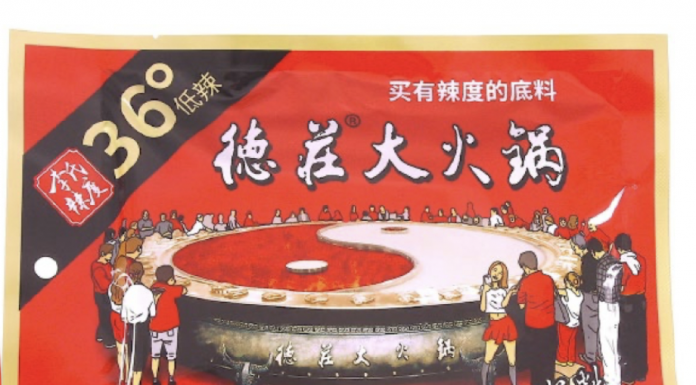PLUS: Why we should get a lot less food from China
FOOD SAFETY NEWS – South El Monte, CA-based BC Food LA, LLC, doing business as B & C Food Co., has recalled more than 1,600 pounds of Chinese-style hot pot base products containing beef tallow.
The products were imported from the People’s Republic of China, a country ineligible to export beef to the United States, according to USDA’S Food Safety and Inspection Service (FSIS).
[Food Safety News reported in February that another CA-based distributor, GLG Trading Inc., recalled over 48 tons of beef tallow products imported from China.]
There is concern that some products may be in consumers’ homes. Consumers who have purchased these products are urged not to consume them, according to a recall notice from the USDA’s Food Safety and Inspection Service (FSIS). These products should be thrown away or returned to the place of purchase.
The Chinese-style hot pot base products were imported on or around June 24, 2020. The following products are subject to recall:
- 10.5-oz. (300 g) Plastic vacuum wrapped packages containing a “Lee’s 52° Da Zhuang” Hot Pot Base and a best before the date of 10/12/2021 on the label.
- 10.5-oz. (300 g) Plastic vacuum wrapped packages containing a “Lee’s 45° Da Zhuang” Hot Pot Base and a best before the date of 10/12/2021 on the label.
- 10.5-oz. (300 g) Plastic vacuum wrapped packages containing a “Lee’s 36° Da Zhuang” Hot Pot Base and a best before the date of 10/12/2021 on the label.
- The product labels are written in Chinese. Refer to the label link here for additional product information. The products do not bear an establishment number nor a USDA mark of inspection. These items were shipped to retail locations in California, Nevada, and Oklahoma.
This entry scheme was discovered when FSIS received an anonymous report of ineligible beef tallow products imported from China.
There have been no confirmed reports of adverse reactions because of the consumption of these products. Anyone concerned about a reaction should contact a healthcare provider.
FSIS routinely conducts recall effectiveness checks to verify recalling firms notify their customers of the recall and that steps are taken to make certain that the product is no longer available to consumers. When available, the retail distribution list(s) will be posted on the FSIS website at www.fsis.usda.gov/recalls.
Consumers with food safety questions can call the toll-free USDA Meat and Poultry Hotline at 1-888-MPHotline (1-888-674-6854) or live chat via Ask USDA from 10 a.m. to 6 p.m. (Eastern Time) Monday through Friday. Consumers can also browse food safety messages at Ask USDA or send a question via email to [email protected].
For consumers that need to report a problem with a meat, poultry, or egg product, the online Electronic Consumer Complaint Monitoring System can be accessed 24 hours a day at https://foodcomplaint.fsis.usda.gov/eCCF/.
Why we should get a lot less food from China
By Will Coggin, June 10, 2020
“Many of the catfish and tilapia we import from China swim in pens polluted with waste and improperly used chemicals. Some fish are literally fed with manure.”
NEW YORK POST – As the United States discovered at the worst possible time, you shouldn’t have your supply chain for critical goods rely on a foreign — and often adversarial — country.
Right as the pandemic hit, America and our front-line workers faced shortages of critical medical equipment manufactured in China. The Beijing regime delayed shipments and later shipped goods that didn’t meet standards.
Now, policymakers are looking for other ways in which we can make sure important goods aren’t dependent on unreliable supply chains. A good start is what we eat.
Thirty-three percent of vegetables, 55 percent of fruits and 94 percent of the seafood we eat is imported. Each year, billions of pounds of food are produced in China.
Recently, Team Trump announced an executive order aimed at boosting our domestic production of seafood. The order establishes a task force to streamline regulations on domestic aquaculture, find new markets to pursue and identify unfair trade barriers to confront.
Among the reasons cited was food safety: Many of the catfish and tilapia we import from China swim in pens polluted with waste and improperly used chemicals. Some fish are literally fed with manure.
We’ve heard the horror stories of Chinese food scandals: plastic rice, exploding watermelons, rat meat sold as lamb. Worse, we’ve experienced it: Remember melamine in pet food that killed many household pets?
Food safety issues are endemic in Communist China. A 2016 report from the firm QIMA, which audits food-processing companies in China, found that 48 percent of the Chinese plants it inspected failed to meet the standards of its Western clients.
Violations included contamination with pesticides, medical drugs, heavy metals, bacteria, and viruses.
It isn’t just seafood. China is the leading exporter of ginger … READ MORE.



